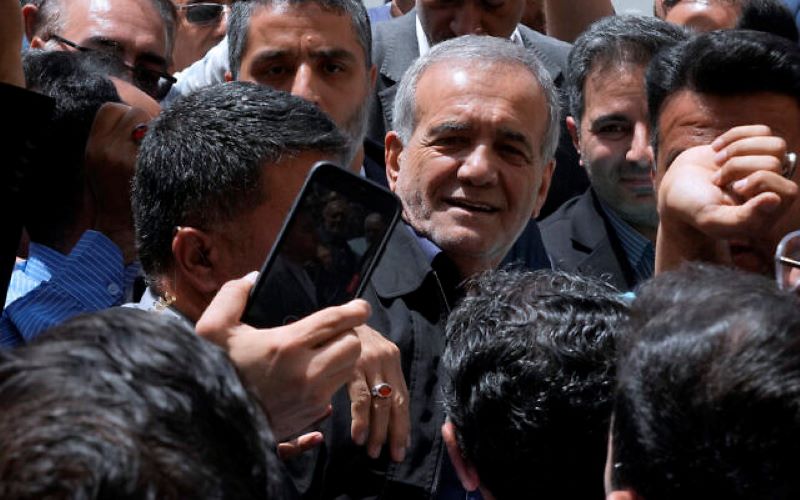Reformist candidate Masoud Pezeshkian won Iran’s runoff presidential election Saturday, besting hard-liner Saeed Jalili by promising to reach out to the West and ease enforcement on the country’s mandatory headscarf law after years of sanctions and protests squeezing the Islamic Republic.
Pezeshkian promised no radical changes to Iran’s Shiite theocracy in his campaign and long has held Supreme Leader Ayatollah Ali Khamenei as the final arbiter of all matters of state in the country. But even Pezeshkian’s modest aims will be challenged by an Iranian government still largely held by hard-liners, the ongoing Israel-Hamas war in the Gaza Strip, and Western fears over Tehran enriching uranium to near-weapons-grade levels with enough of a stockpile to produce several nuclear weapons if it chose.
A vote count offered by authorities put Pezeshkian as the winner with 16.3 million votes to Jalili’s 13.5 million in Friday’s election. Overall, Iran’s Interior Ministry said 30 million people voted in an election held without internationally recognized monitors, representing a turnout of 49.6% — higher than the historic low of the June 28 first round vote but lower than other presidential races.
Supporters of Pezeshkian, a heart surgeon and longtime lawmaker, entered the streets of Tehran and other cities before dawn to celebrate as his lead grew over Jalili, a hard-line former nuclear negotiator. Pezeshkian later traveled to the mausoleum of the late Grand Ayatollah Ruhollah Khomeini, the leader of the 1979 Islamic Revolution, and addressed journalists in a chaotic event.
“In this election, I didn’t give you false promises. I did not lie,” Pezeshkian said. “It’s been many years after the revolution that we come to the podium, we make promises and we fail to fulfill them. This is the biggest problem we have.”
Pezeshkian’s win still sees Iran at a delicate moment, with tensions high in the Mideast and a looming election in the United States that could put any chance of a detente between Tehran and Washington at risk. Pezeshkian’s victory also wasn’t a rout of Jalili, meaning he’ll have to carefully navigate Iran’s internal politics as the doctor has never held a sensitive, high-level security post.
Government officials up to Khameni, the supreme leader, predicted higher turnout as voting got underway, with state television airing images of modest lines at some polling centers. However, online videos purported to show some polls empty while a survey of several dozen sites in Tehran saw light traffic and a heavy security presence on the streets.
Authorities counted 607,575 voided votes — which often are a sign of protest by those who feel obligated to cast a ballot but reject both candidates.
Khamenei praised the turnout Saturday despite what he alleged was a boycott campaign “orchestrated by the enemies of the Iranian nation to induce despair and a feeling of hopelessness.”
“I would like to recommend Dr. Pezeshkian, the elected president, put his trust in G-d, the Compassionate, and set his vision on high, bright horizons,” Khamenei added.
Voters expressed a guarded optimism.
“I don’t expect anything from him — I am happy that the vote put the brake on hard-liners,” said bank employee Fatemeh Babaei, who voted for Pezeshkian. “I hope Pezeshkian can return administration to a way in which all people can feel there is a tomorrow.”
Pezeshkian, who speaks Azeri, Farsi and Kurdish, campaigned on outreach to Iran’s many ethnicities. He represents the first president from western Iran in decades — something people hope will aid the county as those in the western part are considered more tolerant because of the ethnic and religious diversity in their area.
The election came amid heightened regional tensions. In April, Iran launched its first-ever direct attack on Israel over the war in Gaza, while militia groups armed by Tehran — such as the Lebanese Hezbollah and Yemen’s Houthi rebels — are engaged in the fighting and have escalated their attacks.
While Khamenei remains the final decision-maker on matters of state, Pezeshkian could bend the country’s foreign policy toward either confrontation or collaboration with the West.
Crown Prince Mohammed bin Salman of Saudi Arabia, which has reached a detente with Iran, sent his congratulations to Pezeshkian that stressed his “keenness to develop and deepen the relations that bring our two countries and peoples together.” Russian President Vladimir Putin, who has relied on Iranian-made drones in his war on Ukraine, similarly congratulated Pezeshkian.
Responding to questions from The Associated Press, the State Department called the Iranian election “not free or fair” and noted that “a significant number of Iranians chose not to participate at all.”
“We have no expectation these elections will lead to fundamental change in Iran’s direction or more respect for the human rights of its citizens,” the State Department added. “As the candidates themselves have said, Iranian policy is set by the supreme leader.”
However, it said it would pursue diplomacy “when it advances American interests.”
(AP)












2 Responses
This will result in a major increase in pressure on Israel to make concessions that most zionists find to be unacceptable.
Fourth election in five weeks won by the “Left” although the meaning of the term varies from country to country. Mexico, UK, France, and now Iran. Not sure how much authority the President of Iran actually has though.